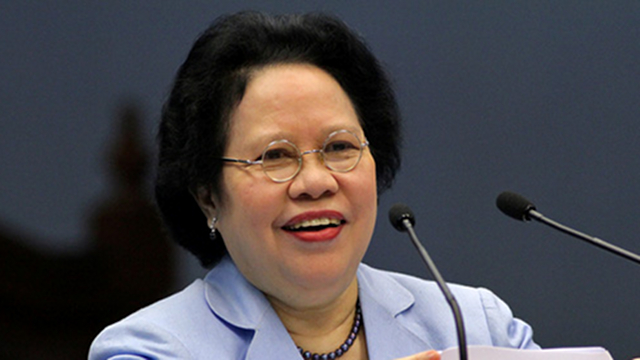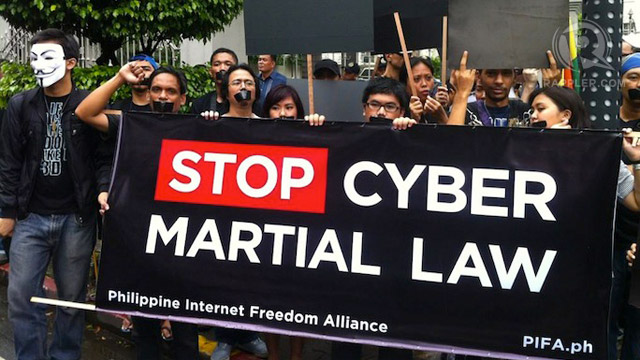SUMMARY
This is AI generated summarization, which may have errors. For context, always refer to the full article.

MANILA, Philippines – After the outrage and backlash, lawmakers are proposing a new and improved version of the anti-cybercrime law.
Sen Miriam Defensor Santiago urged the Senate to pass a bill she filed on November 12, calling it the “anti-cybercrime law version 2.0.”
In a statement on Friday, November 30, Santiago said the Magna Carta for Philippine Internet Freedom will define and penalize cybercrimes while protecting rights and freedoms.
“The [Magna Carta] does not suffer from overbreadth and vagueness in its provisions on libel, unlike the law it tries to replace. In fact, it treats libel as a civil liability rather than a criminal act, which is a step forward in the move to decriminalize libel,” Santiago said.
The senator was referring to the Cybercrime Prevention Act of 2012 or Republic Act 10175, which various sectors criticized for allegedly violating freedom of expression and giving the government too much power over Internet users. Rappler was among the groups who stood against the law.
In October, the Supreme Court stopped the implementation of the law by issuing a 120-day temporary restraining order. Oral arguments are scheduled in January.
Lawmakers and President Benigno Aquino III drew flak for approving and enacting the law despite its questionable provisions. Based on Senate records, Santiago did not take part in the Senate vote on the bill.
Santiago’s bill is the latest among efforts of lawmakers to correct the law. Other senators and congressmen have filed bills amending provisions in the Act.

Improvements on the law
Santiago said her bill will address the loopholes in the law and achieve its objectives.
“While it is important to crackdown on criminal activities on the Internet, protecting constitutional rights like free expression, privacy, and due process should hold a higher place in crafting laws,” she said.
The following are the improvements Santiago cited:
1. On the real-time collection of traffic data
Santiago said her bill addresses criticism of the provision allowing state agents to collect real-time traffic data, which she said violates the right to privacy.
“In contrast, the [Magna Carta] ensures due process by providing strict guidelines for any collection of any data, including the securing of warrants, obligating notification, and limiting seizure to data and excluding physical property.”
2. On the so-called ‘takedown clause’
Santiago said her bill does not have the so-called “takedown clause,” which allows government to block or restrict access to a website or network even without a court order.
“My bill specifically provides for court proceedings in cases where websites or networks are to be taken down, and prohibits censorship of content without a court order.”
Santiago said the “takedown clause” is dangerous. The Justice Department though has said the phrase is a misnomer, because blocking or restricting of the data will not be done arbitrarily.
3. On double jeopardy
The senator said the Magna Carta prohibits double jeopardy, unlike the Cybercrime Prevention Act.
She said under the Act, people can be prosecuted for violations against it, and for those under the Revised Penal Code and special laws even though the offenses are from a single act.
Santiago said the other improvements in the Magna Carta are:
- Clarifying the mandate and organization of the Department of Information and Communications Technology
- Amendments to the AFP Modernization Act to ensure the country has weapons and defenses against cyberattacks
- Mandating the police and the National Bureau of Investigation to combat cyberterrorism
Crowdsourced law
Santiago said the Magna Carta was the result of crowdsourcing. She said a group of concerned citizens including software designers, IT specialists, academics, bloggers, lawyers and engineers approached her office with a draft of the bill.
She said the draft was based on discussions on social media.
“If passed into law, SB No 3327 will be the first law to be created through ‘crowdsourcing,’” she said.
Sen Teofisto Guingona III, the lone senator who voted against the Cybercrime Prevention Act, has also pushed for crowdsourcing as he crafts amendments to the law.
Read Santiago’s bill here:
What are your thoughts on the Magna Carta? Let us know in the comments below. – Rappler.com
Related stories:
Add a comment
How does this make you feel?
There are no comments yet. Add your comment to start the conversation.